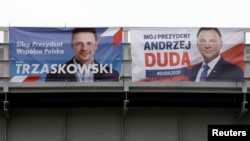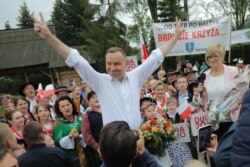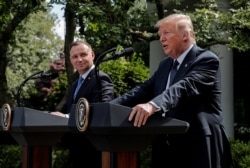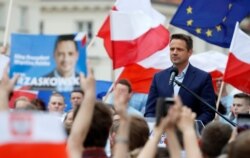Polish President Andrzej Duda hopes a midweek meeting with U.S. President Donald Trump will determine the course of his electoral fortunes — and his country's politics.
Duda is hoping a pledge from the U.S. leader to move American troops stationed in Germany to Poland — as well as an emphatic electoral endorsement from Trump — will boost his chances in Sunday's presidential election, say analysts.
But it is unclear whether the electoral endorsement — which broke diplomatic norms and prompted criticism from both U.S. Democratic Party lawmakers and Duda's Polish opponents, who accused the American leader of intruding in their elections — or the promise to redeploy GIs will be enough to secure Duda a second term.
Pollsters say the outcome of a rambunctious and polarizing election campaign, which has centered in recent days on Duda's promise to ban LGBT education in schools and his refusal to endorse same-sex marriage or gay adoption, is too close to call. Duda enjoyed a commanding lead in the polls just weeks ago but that has evaporated, partly because of the economic impact of the coronavirus.
Warsaw's liberal mayor, Rafal Trzaskowski, his nearest rival and the candidate of the Civic Coalition (KO) alliance, the country's main centrist opposition bloc, has proven an energetic campaigner. Polls suggest the 48-year-old Oxford University-educated Trzaskowski stands a chance of pulling off a victory in a runoff vote, if opposition parties unite around him.
Duda is expected to top the ballot Sunday but be denied an outright majority in the first round, which features 11 candidates in all. Political survey aggregator Europe Elects is predicting he will get 41 percent of the vote, not enough to avoid a runoff in two weeks against, presumably, Trzaskowski.
Duda was Trump's first foreign visitor since March, when the coronavirus pandemic struck the U.S. The Polish president's visit this week to the White House was welcomed by supporters as the kind of lift his campaign needs to grab a win. They are banking on the Washington visit to consolidate support for him in the strongly pro-American country.
Trump and Duda, both populist leaders, have forged close ties since 2017 when the U.S. president visited Warsaw.
"The people of Poland think the world of him. I don't think he needs my help. He will do very well with or without us," the U.S. president said during Duda's midweek White House visit. "I don't think we've ever been closer to Poland than right now."
Trump held out the prospect of an even stronger alliance with Poland, if Duda gets reelected.
For all the glowing words, Wawrzyniec Smoczynski, a social scientist at Warsaw's private university SWPS, is doubtful about the electoral boost Duda can expect.
"This won't help Duda much in the election," he told Poland's Radio TOKFM.
But members of Poland's ruling conservative-nationalist Law and Justice Party, which is backing Duda, a former party member and devout Catholic, believe the final result could be within a percentage point or two, and that Trump's intervention, though prompting an opposition clamor, won't harm the incumbent among most Poles who support him and could be just enough to sway doubters.
European interest
Poles aren't the only ones watching the election closely. It is the first national election in Europe since the coronavirus pandemic struck and is being seen as a possible continentwide bellwether. Duda's campaign matches the style of electioneering pursued by Hungary's firebrand anti-migrant populist Viktor Orban, one combining right-wing conservatism emphasizing "family values" and criticism of the European Union.
The overall message both European leaders espouse is a claim that national sovereignty is being undermined by globalization, and nation states and their traditional cultures and lifestyles are being weakened by bankers and urban elites.
Like Orban, Duda and the PiS (Law and Justice Party) have been accused by domestic critics and Brussels of eroding democratic checks and balances, of seeking to curb judicial independence, and of expanding state control over the media and civil society. But as in Hungary, wide-ranging social spending and economic growth have been key factors behind the recent election wins by the conservative-nationalists. The PiS won last October's parliamentary election, say analysts, partly thanks to generous social benefits, including lowering the retirement age.
'Family values'
Duda had hoped to focus largely on economic issues, according to his campaign advisers, Before the pandemic, Poland's economy was growing by nearly 5 percent. But the pandemic has prompted an economic downturn and Poland is headed for its first recession since the end of communism. This has prompted Duda's increased emphasis on "family values" and polarizing cultural issues.
The Polish president's focus on LGBT+ rights and liberal values have delighted his base of socially conservative supporters in rural and small-town Poland. But gay rights campaigners and urban liberals have been enraged by Duda's condemnation of the LGBT movement as "a foreign ideology" and his comparison of it to indoctrination seen during the Soviet era.
Trzaskowski has been running on the campaign slogan "Enough is enough," and has focused on rule of law, corruption issues and European liberal values. But his main challenge is to broaden his appeal beyond Warsaw and to make headway with the country's small-town voters. Trzaskowski has been circumspect in his support for gay rights.
"He's talented, and he's a fully European intellectual, but that's not necessarily a recommendation in the elections," Adam Michnik, editor of the liberal newspaper Gazeta Wyborcza, said last week.







